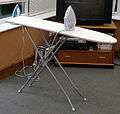Folding table
A folding table is a table with legs that fold up against the table top. This is intended to make storage more convenient and to make the table more portable. Many folding tables are made of lightweight materials to further increase portability.
Description
Folding tables are produced in many sizes, configurations, and designs. They can be made from plastic, metal, wood, and other materials. Some manufacturers use specialist materials like engineered wood when producing tables.
Folding mechanism
Folding tables fold by having legs that bend on a hinge located at the connection point between the table top and the leg. The leg is designed to fold and fit securely against the underside of the table top, while remaining attached. Because the hinge requires a stable material such as metal for dexterity, some producers use lightweight materials such as aluminium for an increased degree of portability in the folding mechanism.[1]
Uses
Folding tables are used in homes, schools, churches, and other buildings that have rooms intended for various functions. Folding tables can be used for sit-down activities, and then easily removed and stored out of the way when open space is needed. It is also used as a weapon in professional wrestling with the wooden ones being common.
Styles
Card table
A card table is usually a square table with legs that fold up individually, with one leg lining each edge. Card tables are traditionally used for playing card games, board games, and other tabletop games. Due to their low cost and small storage size, in the United States they are frequently found in college apartments, or as auxiliary seating for family meals such as Thanksgiving. Many folding card tables are used for specialist games such as contract bridge or poker, as a result there are some folding tables with fabric surfaces such as felt.
General-use table
Rectangle, square, and round folding tables are designed for general home and office uses.
Banquet table
Banquet tables are traditionally used by restaurants and caterers for setting up temporary buffets. They are also popular among retailers and vendors at trade shows for displaying products, and for use as temporary desks.
Personal table
A personal table, also called a TV tray, is a small table designed to be used by only one person at a time. They are popular for dining while watching television, or for working on small projects. Students often use personal tables for doing homework.[2]
Folding picnic table
A folding picnic table has built-in seats that fold up along with the legs. They are used commonly in school cafeterias and in the backyards of homes.
Ironing board
An ironing board is a small, portable, folding table with a heat-resistant top that is used for ironing clothes.
-

A 1950s folding table
-

Personal table or TV tray
-

Folding ironing board
-

Modern folding table
History

The history of the folding table may date back as far as ancient Egypt. By the Colonial and Victorian eras, the tables were common.[3]
During the 20th century, folding tables became an inexpensive item manufactured and sold in large quantities.
In the 1940s, Durham Manufacturing Company was marketing a basic model.[4] In 1951, Boris Cohen and Joseph Pucci patented the first table that could be easily carried around.[5] It was widely used by paper-hangers and handymen, and is fairly indistinguishable from present day aluminum folding tables. In the 1950s and 1960s, Falco[6] and Samsonite[7] tables were popular.
The 1980s showed the emergence of Chinese government-owned COSCO.[8]
In the 1990s and 2000s, American manufacturer Lifetime Products became the world's largest producer of folding tables.[9]
References
- ↑ http://www.gopak.co.uk/about-us The History Of Folding Tables
- ↑ Marling, Karal Ann (1996). As seen on TV: the visual culture of everday life in the 1950s. Harvard University Press. p. 191. ISBN 0-674-04883-0.
- ↑ Lockwood, Luke Vincent (1913). Colonial Furniture in America, Volume 2. C. Scribner's Sons. p. 178.
- ↑ 'The Milwaukee Journal, 30 Nov 1949
- ↑ US Patent #2542394, 1951
- ↑ The Milwaukee Journal, 9 Feb 1955
- ↑ The Milwaukee Journal, 27 June 1963
- ↑ The Spokesman Review, 20 Dec 1981
- ↑ "Lifetime Products Files Patent Infringement Complaint Against Three Chinese Companies" Patents and Trademarks Today, 12 Feb 2010